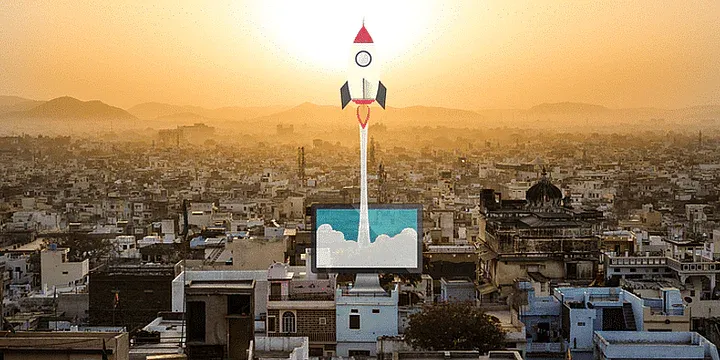UPI goes to France
After the UAE, Singapore, Nepal, and Bhutan, this is NPCI International's fifth global partnership to expand India's digital payment products—UPI and Rupay cards—across the globe.
Hello Reader,
Let’s face it, NPCI’s international arm has travelled more than the average wanderlust-ing millennial in the last two years.
After the UAE, Singapore, Nepal, Bhutan, and other countries, UPI will now be available in France with NPCI International Payments Limited (NIPL) signing an MoU with Lyra Network, a French payments solutions provider, for acceptance of UPI and RuPay cards.
In other news, stock markets continue to tumble in the wake of global factors. On Thursday, while the S&P BSE Sensex tanked nearly 2.12 percent over its previous day’s close to touch its 52-week low of 51,425.48 points, the Nifty fell 2.28 percent to a 52-week low of 15,335.1 points.
But how are the seven Indian tech startups that went public in 2021 faring? Read our in-depth analysis.
Also, our favourite space ranger Buzz Lightyear is back! Are you ready?
“To infinity and beyond,” we say.
Why Fractal’s time is now
In 2000, IIM Ahmedabad alumni Srikanth Velamakanni, Pranay Agrawal, Nirmal Palaparthi, Pradeep Suryanarayan, and Ramakrishna Reddy launched Fractal Analytics, an analytics SaaS (Software-as-a-Service) provider that addressed database queries.
A lot has changed since then. At present, only Srikanth and Pranay are at the helm of the startup, which also attained billion-dollar valuation this year after it raised $360 million from private equity firm TPG Capital Asia.
In a conversation with YourStory, Srikanth said works with close to 140 clients today, all of which have revenues over $10 billion. “When targeting clients, we go by the 10-20-30 rule—it should either have $10 billion in revenue, $20 billion in market cap, or 30 million customers,” he added.
Key takeaways:
- Fractal clocked revenue of $174 million, or about Rs 1,295 crore in FY 2022, of which nearly 70 percent comes from the US.
- It aims to bring data and algorithms to every client decision, using cutting-edge AI.
- Most recently, Fractal Analytics acquired Neal Analytics to scale its AI offerings on the Microsoft multi-cloud ecosystem.
On a possible market debut, Srikanth said, “We think of it as a 100-year journey so going public is consistent with that mindset. If the markets are permissive, it is just a question of timing and getting our ducks in a row.”
Tier II+ entrepreneurs face post-pandemic realities
In 2021—considered a period of homecoming for skilled professionals due to the COVID-19 pandemic—talent moved back from metros to smaller cities. New ideas started emerging from smaller towns. The reach of internet services also helped companies manage workload despite lockdowns.
The possibilities, it seemed, were endless. Cities such as Kochi, Indore, Bhopal, Jaipur, and Srinagar, which earlier lacked the technology startup ecosystem, began buzzing with new activity.
However, startups are now setting up offices in Tier I cities.
A quick look:
- Cities such as Gurugram and Bengaluru have offices of the top venture capital firms, including Sequoia Capital India, Lightspeed Venture, and Elevation Capital.
- Tier I cities have bustling startup culture, with frequent founder meetups and accelerator programmes.
- The frequency of these programmes has increased post-pandemic.
“Growing beyond a point is not possible in Tier II and III cities. While hiring can also be solved for, non-metro cities do not have the ecosystem as of now to nurture growing startups,” said Sushil Sharma, Founder, Marwari Catalyst Ventures.

What is ZK proofing?
A Zero Knowledge proof (ZK proof) enables one party to prove to another that a transaction is valid without disclosing transaction information to prove the validity. For example, loan providers need credit scores and other financial details. However, this process can leave users vulnerable to information leaks. In this situation, a ZK proof would preserve private details of the user by only revealing specific information to the loan provider.
This concept has found a use case in blockchain.
Despite being the most widely adopted platform for blockchain-based apps, Ethereum (ETH) suffers from slow transaction speeds and high transaction costs (gas fees), which can rise to hundreds of dollars even for micro transactions, due to network congestion.
This is where Layer 2 solutions and ZK rollups and proofs come into play, not only by bringing privacy to the Ethereum blockchain but by also reducing the amount of data that needs to be shared and proven between users.
Key takeaways:
- ZK rollups and proofs allow bundled transactions to be valid off the main blockchain in a cheaper, faster, and more privacy-focused manner.
- One key disadvantage is that ZK proofs require robust infrastructure (computers) to run and a high degree of data optimisation to reach their true potential.
- Ethereum scaling infrastructure solution Polygon is one of the primary drivers for ZK in Ethereum scaling, and has even committed $1 billion to its ZK-related efforts.
Now get the Daily Capsule in your inbox. Subscribe to our newsletter today!







